|
|
|
Sort Order |
|
|
|
Items / Page
|
|
|
|
|
|
|
| Srl | Item |
| 1 |
ID:
100412
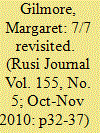

|
|
|
|
|
| Publication |
2010.
|
| Summary/Abstract |
The inquests into the 7 July 2005 London transport bombings began on 11 October 2010. Evaluating huge amounts of evidence, the coroner and her team will seek answers for survivors and relatives. They will also scrutinise the actions of the British security services in the months and weeks leading up to the attacks, asking whether the terrorists could have been stopped and the victims saved.
|
|
|
|
|
|
|
|
|
|
|
|
|
|
|
|
| 2 |
ID:
112167
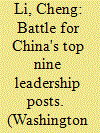

|
|
|
| 3 |
ID:
129237
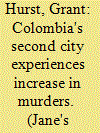

|
|
|
| 4 |
ID:
099867


|
|
|
|
|
| Publication |
2010.
|
| Summary/Abstract |
We gauge the cost of crime in Italy by concentrating on a subset of offences covering about 64% of total recorded crimes in the year 2006. Following the breakdown of costs put forward by Brand and Price, we focus on the costs in anticipation, as a consequence, and in response to a specific offence. The estimated total social cost is more than €38 billion, which amounts to about 2.6% of Italy's GDP. To show the usefulness of these measures, we borrow the elasticity estimates from recent studies concerning the determinants of crime in Italy and calculate the cost associated with the surge in crime fuelled by unemployment and pardons. Indeed, in both cases such costs are substantial, implying that they should no longer be skipped when assessing the relative desirability of public policies towards crime.
|
|
|
|
|
|
|
|
|
|
|
|
|
|
|
|
| 5 |
ID:
075682


|
|
|
| 6 |
ID:
129366
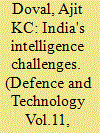

|
|
|
|
|
| Publication |
2012.
|
| Summary/Abstract |
Unlike in the past when it was not a tabooed subject, intelligence has entered the arena of public discourse. We have to accept the reality as it is and not as we wish it to be. Not only the intelligence production -- which can be a legitimate matter of public concern -- but even the processes, structures and systems will increasingly come under public scrutiny. The Intelligence agencies should start deliberating on a public interface mechanism which, in the long run, may even include a media and public relation exercise. In the way Indian democracy is evolving, it will be in the national interest to educate the media and have working relation with it rather than allow it to go haywire for want of knowledge and authentic information. A well thought out action plan on this count may take two to three years before it is made operational.
|
|
|
|
|
|
|
|
|
|
|
|
|
|
|
|
| 7 |
ID:
108536
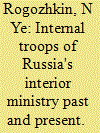

|
|
|
| 8 |
ID:
117687


|
|
|
|
|
| Publication |
2013.
|
| Summary/Abstract |
Camera surveillance has recently gained prominence in policy proposals on combating terrorism. We evaluate the instrument based on a comparative perspective and previous evidence on crime. We expect camera surveillance to have a relatively smaller deterrent effect on terrorism than on other forms of crime. In particular, we emphasize that: (i) terrorists have more opportunities for substitution; (ii) targets under camera surveillance might become more and not less attractive if terrorists aspire media attention; (iii) real-time interventions are limited as behaviour is only understood as suspicious in the light of hindsight; and (iv) closed-circuit television might crowd out social surveillance.
|
|
|
|
|
|
|
|
|
|
|
|
|
|
|
|
| 9 |
ID:
065952


|
|
|
| 10 |
ID:
129022


|
|
|
| 11 |
ID:
155827
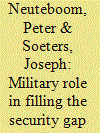

|
|
|
|
|
| Summary/Abstract |
During stabilization operations, the host nation and the international community are often confronted with a security gap, which could be a prelude to an explosive growth of crime and public disorder. In the absence of a functioning local police, an alternative is that the (international) military temporarily intervenes as interim police. This article analyzes how the Netherlands’ military performed during security gaps in three (post)conflict areas: Bosnia and Herzegovina, Kosovo, and Iraq. It concludes that army units frequently were involved in interim policing and de facto operated as hybrid organizations, without leaving the military paradigm behind. Policing is generally not seen as a primary task of the military, however. To adapt to the reality of security gaps and to increase the operational effectiveness in the field of public security, the military would benefit from reflecting on their current military paradigm and on what they could learn from current policing practices.
|
|
|
|
|
|
|
|
|
|
|
|
|
|
|
|
| 12 |
ID:
121944
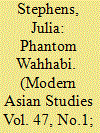

|
|
|
|
|
| Publication |
2013.
|
| Summary/Abstract |
In the late 1860s and early 1870s the British colonial government in India suppressed an imagined Wahhabi conspiracy, which it portrayed as a profound threat to imperial security. The detention and trial of Amir and Hashmadad Khan-popularly known as the Great Wahhabi Case-was the most controversial of a series of public trials of suspected Wahhabis. The government justified extra-judicial arrests and detentions as being crucial to protect the empire from anti-colonial rebels inspired by fanatical religious beliefs. The government's case against the Khan brothers, however, was exceptionally weak. Their ongoing detention sparked a sustained public debate about the balance between executive authority and the rule of law. In newspapers and pamphlets published in India and Britain, Indian journalists and Anglo-Indian lawyers argued that arbitrary police powers posed a greater threat to public security than religious fanatics. In doing so, they embraced a language of liberalism which emphasized the rule of law and asserted the role of public opinion as a check on government despotism. Debates about the Great Wahhabi Case demonstrate the ongoing contest between authoritarian and liberal strands of imperial ideology, even at the height of the panic over the intertwined threat of Indian sedition and fanatical Islam.
|
|
|
|
|
|
|
|
|
|
|
|
|
|
|
|
| 13 |
ID:
118915


|
|
|
|
|
| Publication |
2012.
|
| Summary/Abstract |
This paper is concerned with the operational activities of the public security organs of the People's Republic of China during the immediate post-1949 period of regime consolidation. The main part of the paper is a case-study of a 1950 pilot scheme to recruit agents in critical sectors of industry and trade in the city of Yingkou in Northeast China, a scheme in due course subsumed under a nationwide programme with a similar focus. In the years to follow, the operational recruitment of agents would become one of China's arguably most important operational responses to the twin Cold War threats of economic espionage and-above all-sabotage. This paper's findings suggest, with respect to operational activities, that in order to represent and explain more fully, in Leopold von Ranke's words, 'how things really were', social and political historians may well want to shift their focus away from successive highly public Maoist 'mass movements' and look instead to what transpired out of the public eye in the interregnum of ordinary times that such movements punctuated. If and when they do, they will discover significant yet hitherto largely unexplored similarities between the work of the early People's Republic of China public security organs and their counterparts in the Soviet Union and other (former) socialist states.
|
|
|
|
|
|
|
|
|
|
|
|
|
|
|
|
| 14 |
ID:
156607
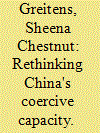

|
|
|
|
|
| Summary/Abstract |
Discussions of China's rising domestic security expenditure often present this spending as evidence of the Chinese Communist Party's strong coercive capacity. This article argues that a lack of theoretical clarity about domestic security has resulted in flawed conclusions about these expenditures and their implications for China's coercive capacity. Challenging the conventional wisdom, the article analyses China's domestic security spending from 1992 through 2012 and argues that it is important to consider not only the total amount that China spends but also how it spends these resources and the magnitude of the threats that this expenditure must address. It finds that China's domestic security spending is not historically unprecedented, is not expanding as a proportion of national expenditure, and is not necessarily high (or producing high coercive capacity) when compared to other countries. The article also shows that certain locations struggle more to fund their coercive capacity than others, and that these locations overlap with areas where internal security threats may be particularly acute. The challenges that the coercive apparatus must address have also grown over the same period during which domestic security spending has risen. Finally, attempts to improve the political position of China's coercive agents cannot be equated with improvements in their capacity to manage Chinese society. Cumulatively, this reassessment provides more evidence of the limitations on China's coercive capacity than of its strength.
|
|
|
|
|
|
|
|
|
|
|
|
|
|
|
|
| 15 |
ID:
139556
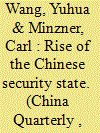

|
|
|
|
|
| Summary/Abstract |
Over the past two decades, the Chinese domestic security apparatus has expanded dramatically. “Stability maintenance” operations have become a top priority for local Chinese authorities. We argue that this trend goes back to the early 1990s, when central Party authorities adopted new governance models that differed dramatically from those of the 1980s. They increased the bureaucratic rank of public security chiefs within the Party apparatus, expanded the reach of the Party political-legal apparatus into a broader range of governance issues, and altered cadre evaluation standards to increase the sensitivity of local authorities to social unrest. We show that the origin of these changes lies in a policy response to the developments of 1989–1991, namely the Tiananmen democracy movement and the collapse of communist political systems in Eastern Europe. Over the past twenty years, these practices have developed into an extensive stability maintenance apparatus, whereby local governance is increasingly oriented around the need to respond to social unrest, whether through concession or repression. Chinese authorities now appear to be rethinking these developments, but the direction of reform remains unclear.
|
|
|
|
|
|
|
|
|
|
|
|
|
|
|
|
| 16 |
ID:
131886


|
|
|
| 17 |
ID:
151153


|
|
|
|
|
| Summary/Abstract |
We examine the social dynamics of crime by means of evolutionary game theory, and we model the choice of boundedly rational potential victims to privately self-protect against prospective offenders. Negative externalities from self-protection, as the socially transmitted fear of victimization, can influence the strategic choices of victims even with constant or declining crime rates, and this circumstance may lead to Pareto inefficient equilibria with excessive expenses for private protection. Providing higher levels of public security (or of appropriate social care) financed through discriminatory taxation of private defensive behaviors can prevent crime and reduce superfluous self-protection, thus driving the social dynamics toward a more efficient equilibrium. Public policy can therefore be effective in implementing the social optimum. This article extends previous work by Cressman, Morrison, and Wen by increasing the range of possible dynamics and the scope for public intervention. Consequently, in our model, public policy can deter crime and improve the welfare of victims by addressing the intangible aspects of crime, that is, the social dynamics of fear.
|
|
|
|
|
|
|
|
|
|
|
|
|
|
|
|
| 18 |
ID:
130401
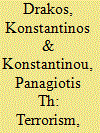

|
|
|
|
|
| Publication |
2014.
|
| Summary/Abstract |
Within a panel VAR framework and utilizing generalized impulse response and forecast error variance decomposition analysis, we explore the dynamic effects of terrorism and crime on public order and safety spending across European countries during the period 1994-2006. Our findings show that a 'shock' in terrorism and/or in crime, significantly increases the subsequent trajectory of public order and safety spending. As a by-product, we find that public spending is ineffective in reducing observed crime or terrorism.
|
|
|
|
|
|
|
|
|
|
|
|
|
|
|
|
| 19 |
ID:
089347


|
|
|
|
|
| Publication |
2009.
|
| Summary/Abstract |
Following the 2006 gang violence in Timor-Leste amid dissension between the two main security institutions in the country, the Timor-Leste Defence Force (F-FDTL) and the National Police of Timor-Leste (PNTL), the UN Security Council adopted Resolution 1704, establishing a UN multidimensional, integrated mission, including UN police with an executive policing mandate, to ensure the restoration and maintenance of public security. With the mission winding down in 2009, this article offers an early assessment of its accomplishments and setbacks in the realm of security and public order, emphasizing the UNPOL leg of the mission. If the mission succeeded in restoring a modicum of security in Timor-Leste, it fell short of effectively assisting the PNTL reform process, implying that another security crisis erupting in the country cannot be ruled out.
|
|
|
|
|
|
|
|
|
|
|
|
|
|
|
|
| 20 |
ID:
134171
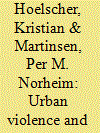

|
|
|
|
|
| Publication |
2014.
|
| Summary/Abstract |
Despite problems of violence domestically, Brazil has played a key leadership role as part of MINUSTAH peacekeeping operations in Haiti since 2004. This article addresses how Brazil's international military engagement is shaping domestic approaches to urban security, and what may be the implications of the use of military strategies, operations, and norms to address issues of public security in Brazilian cities. It is argued that current approaches toward urban security employing military-trained peacekeepers actually represent a continuation of old paradigms, yet these recent militarised approaches are likely evolving into newer and potentially more accountable forms by constraining indiscriminate use of force and establishing a positive state presence in marginal urban areas. As such, the article connects long-established issues of dealing with urban violence in Latin America with ongoing debates in the United States and beyond about post-counterinsurgency approaches to increasingly urban conflict settings. It reflects on potential lessons to be learned from the Latin American perspective, while showing also how these have changed over the last decade. The article concludes that despite the potential utility of force in some urban conflict settings, this approach could entail a normative shift towards legitimising forceful containment of violence, and hinder democratic consolidation in Brazil.
|
|
|
|
|
|
|
|
|
|
|
|
|
|
|
|
|
|
|
|
|